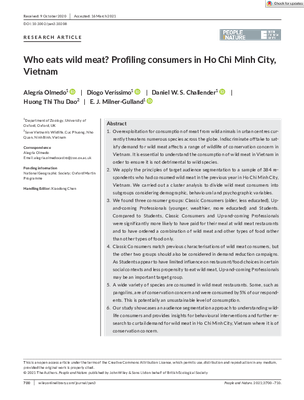Who eats wild meat? Profiling consumers in Ho Chi Minh City, Vietnam
Poaching and illegal trading of wild animals poses a serious threat to wildlife in Vietnam. Wildlife is illegally hunted, traded and sold to be consumed for several purposes throughout the country. One of these purposes is to be consumed as wild meat in restaurants in both cities and rural areas. To understand how we can reduce the consumption of wild meat that threatens wildlife, our team carried out surveys with 384 residents of Ho Chi Minh City, one of Vietnam’s largest and wealthiest cities, who had eaten wild meat in the last year. We identified three different groups of consumers. The first group, called Classic Consumers, are older, less educated people who have been described by past studies in Vietnam. The other two groups have not been described before; these are the Up-and-coming Professionals, who are younger, wealthier and more educated than Classic Consumers; and Students, who are university-aged students with a lower income than the other two groups. While all three groups consume wild meat, we found Students have limited decisionmaking power when eating at wild meat restaurants and this group is more likely to eat other types of food rather than a combination of wild meat and other foods. While these three groups should be targeted to reduce consumption of wild meat in Ho Chi Minh City, each must be targeted differently to achieve a change in their consumption. For example, alternatives to wild meat could be promoted to Up-and-coming Professionals, while restricting the availability of wild meat through law enforcement might be more effective to reduce Classic Consumers’ consumption. We also found that a wide variety of species are consumed in wild meat restaurants. Some, such as pangolins, are endangered and consumption is likely threatening their survival in Vietnam. Our conclusions provide insights for projects that seek to reduce the consumption of wild meat and we encourage others to focus on each of the consumer groups we identified in different and targeted ways.
https://biodiversitylinks.org/learning-evidence/wild-meat-collaborative-learning-group/evidence-collection/evidence-inbox/people-and-nature-2021-olmedo-who-eats-wild-meat-profiling-consumers-in-ho-chi-minh-city-vietnam.pdf/view
https://biodiversitylinks.org/learning-evidence/wild-meat-collaborative-learning-group/evidence-collection/evidence-inbox/people-and-nature-2021-olmedo-who-eats-wild-meat-profiling-consumers-in-ho-chi-minh-city-vietnam.pdf/@@download/image/image.png
File
Who eats wild meat? Profiling consumers in Ho Chi Minh City, Vietnam
Author(s):
Olmedo, Alegría
,
Veríssimo, Diogo
,
Challender, Daniel W. S.
,
Dao, Huong Thi Thu
,
Milner-Gulland, E. J.
Publication Date: 2021
Location: Asia
DOWNLOAD FILE
Poaching and illegal trading of wild animals poses a serious threat to wildlife in Vietnam. Wildlife is illegally hunted, traded and sold to be consumed for several purposes throughout the country. One of these purposes is to be consumed as wild meat in restaurants in both cities and rural areas. To understand how we can reduce the consumption of wild meat that threatens wildlife, our team carried out surveys with 384 residents of Ho Chi Minh City, one of Vietnam’s largest and wealthiest cities, who had eaten wild meat in the last year. We identified three different groups of consumers. The first group, called Classic Consumers, are older, less educated people who have been described by past studies in Vietnam. The other two groups have not been described before; these are the Up-and-coming Professionals, who are younger, wealthier and more educated than Classic Consumers; and Students, who are university-aged students with a lower income than the other two groups. While all three groups consume wild meat, we found Students have limited decisionmaking power when eating at wild meat restaurants and this group is more likely to eat other types of food rather than a combination of wild meat and other foods. While these three groups should be targeted to reduce consumption of wild meat in Ho Chi Minh City, each must be targeted differently to achieve a change in their consumption. For example, alternatives to wild meat could be promoted to Up-and-coming Professionals, while restricting the availability of wild meat through law enforcement might be more effective to reduce Classic Consumers’ consumption. We also found that a wide variety of species are consumed in wild meat restaurants. Some, such as pangolins, are endangered and consumption is likely threatening their survival in Vietnam. Our conclusions provide insights for projects that seek to reduce the consumption of wild meat and we encourage others to focus on each of the consumer groups we identified in different and targeted ways.


